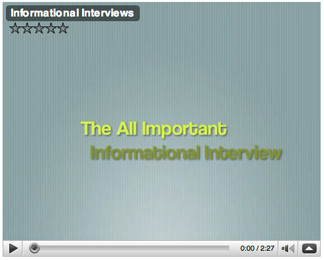 When I was thinking about switching professions, from teaching to publishing, I kept going on interviews and striking out, and I couldn’t figure it out. There had to be something I was doing incorrectly, but what was it? To discover, I began going on informational interviews—setting up meetings with people whom I would have loved to have as bosses, but who weren’t looking for help. This turned out to be how I made the jump.
When I was thinking about switching professions, from teaching to publishing, I kept going on interviews and striking out, and I couldn’t figure it out. There had to be something I was doing incorrectly, but what was it? To discover, I began going on informational interviews—setting up meetings with people whom I would have loved to have as bosses, but who weren’t looking for help. This turned out to be how I made the jump.
The purpose of an informational interview is to find out both what companies in your field is looking for and—just as importantly—what they are not. Also, to discover what their concerns might be from looking at you, and your resume.
The fact that the interview is informational doesn’t mean you don’t have to prep just as carefully as you would if there were a job at stake. In addition to knowing your interviewer’s resume inside and out, you should have a list of questions you’d like to have answered:
- Are there any immediate red flags you see when you look at my resume?
- Are there any skills I should fine tune?
- Are there any new trends in the industry I should be aware of?
Additionally, information interviews are a great place to find out what not to say as well as what you should say—because every industry has one question you can ask, or statement you can make, that just drives people wild.
(For example, when I worked in publishing that phrase was, “And I know my book would be great on Oprah.” Aaaaauugh. I mean, their book might very well be great on Oprah—but getting your book on Oprah is a bit like getting struck by lightning. The effect of a prospective author saying this was only to make everyone in the room think, “High maintenance. Back away slowly.”)
Now it might seem that people in these positions don’t have the time or energy to give to these interviews. I rarely found this to be true. The people I know who’ve been shut down had opened with, “Let me take you to lunch.” While this is a lovely offer, people are busy so respect their time limits up front. Ask them, “May I come in to speak with you for fifteen minutes at the beginning or end of your day?”
Another benefit of this kind of interviewing is that if they are sufficiently impressed with you, they will have you in mind when someone in their field is looking to hire a new person for their team.
Informational interviews are a win/win/win—and all those wins are for you. You get the experience of interviewing, you get the information, and you get the future connection.
Frances Cole Jones
Watch This Post on YouTube

